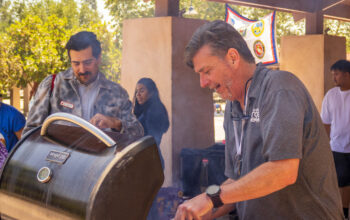The Media Literacy and Skepticism Film Festival kicked off on Feb. 15 in the Great Hall as part of a three-film series.
Co-presented by the English and philosophy departments, the festival is comprised of film screenings, panel discussions and workshops aimed to help verse students in the ability to critically analyze different media formats and differentiate fake from real news.
“Shattered Glass” was shown on Wednesday and is based on a true story about journalist Stephen Glass whose fabrications ensued major consequences for both himself and the magazine that published them as facts.
Following the film was a presentation by Morten Bay, an award-winning author and journalist, whose stance on the difference between “what is truth and what is fact” fueled a discussion on the importance of critical thinking.
“We have to be our own gatekeepers,” Bay said. He said that social media makes us have to judge for ourselves what is factual and fictitious news.
Philosophy professor Melanie McQuitty said believing everything that is published is the reason fake news spreads quickly and effectively.
“We are more willing to trust our peers than someone designated as an expert,” McQuitty said. “Stephen Glass is a metaphor for fake news today.”
Bay recommended getting news from sources such as PBS, NPR, BBC and the New York Times as opposed to other sources that could have a possible agenda.
“We should promote a culture of only sharing facts,” Bay said.
The next screening is “They Live” on March 15, in the Great Hall at 5 p.m.
Workshops on media literacy will be hosted at the Center for Academic Success Wednesdays at 5 p.m.



